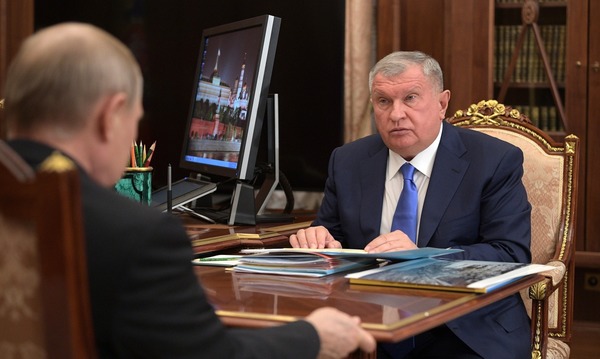RUSSIA MONITOR
Date: 31 July 2019
Sechin’s Tax Privileges At Risk: Is Putin Changing His Mind?
Russian most prominent state-run oil firm Rosneft will fail to get the government’s generous multimillion tax break. The government’s May decision will not be take effect until at least the end of the year. Putin also ordered an unexpected moratorium on any new state support for developing domestic oilfields. The moratorium will remain in effect until the end of 2019. Putin’s latest decision has called into question Igor Sechin’s new oil projects that so far enjoyed substantial support from the state. The Kremlin’s move is surprising because until now, Putin expected that the government fulfill almost all of Sechin’s tax demands. But at this stage, it is not yet known whether this prompts the weakening position of Rosneft’s CEO or whether the Kremlin’s efforts to freeze its aid to the oil giant deems as a part of a large conundrum, both political and financial.

In May 2019, the Russian government approved Rosneft’s February request for tax deductions for developing Priobsky in Western Siberia, its biggest oilfield. What argument did it offer? Rosneft sought deductions for offsetting the extra expense of pumping oil from an aging field that is experiencing depletion. Russian Finance Ministry opposed the idea, but the break was granted, a decision that must have been taken with Putin’s consent. The oilfield’s output is growing, and it does not need additional support, the ministry declared. A meeting on May 27 at Prime Minister Dmitry Medvedev’s office revealed that the draft regulation on awarding tax deductions for Rosneft’s Priobsky oilfield was to be adopted by October 1, 2019, shortly followed by its entry into force. Also, Rosneft expected that the tax break apply retroactively, to the period since the beginning of 2019. In total, tax incentives were believed to amount to 46 billion roubles ( $725 million) over ten years. Sechin’s firm managed to secure tax benefits on the mineral extraction tax (MET, or NDPI in Russian) for its Samotlor oilfield, worth 35 billion roubles over ten years.
Support Us
If content prepared by Warsaw Institute team is useful for you, please support our actions. Donations from private persons are necessary for the continuation of our mission.
In a letter addressed to Deputy Finance Minister Ilya Trunin, Rosneft’s first vice-president Pavel Fedorov explained the need for diminishing tax rates imposed on Priobsky’s oil output with offsetting all losses that arose from Russia’s compliance to the OPEC+ deal. In doing so, Federov was reported to have recalled Putin’s words; in December 2018, the Russian leader allegedly backed an idea to compensate oil companies for any direct losses that resulted from a drop in crude output, as stipulated by the OPEC+ agreement. Rosneft is seeking further tax reliefs, saying that since late 2017 it has produced 22 million tons of oil less than initially planned, while curbing output and sales failed to compensate for higher oil prices that remain at a low level due to an increase in producing U.S.-sourced shale gas.
Russian Finance Ministry, for its part, stood out against treating oil companies, with Sechin’s excessively demanding company at the helm. Ministry officials said this would cost the federal budget over $7 billion over ten years. Interestingly, the Kremlin document, dated July 20, ordered to freeze further tax breaks for Sechin’s company and instructed the energy and finance ministries to outline the economic justifications for providing Rosneft with tax breaks for its oil projects. Earlier, this issue was of minor importance for Putin who, at the request of Sechin, had almost always ordered the government to make concessions to the benefit of Rosneft.
Little is known about how the matter of Sechin’s probably greatest demand ever presented will eventually be tackled in the context of diminishing his firm’s financial commitments to the state. It was not a long time ago when Sechin sent a letter to Putin, in which he asked for backing the draft federation law on a special tax regime for investors that develop their projects in the Arctic, a concept elaborated by the Ministry for Development of the Russian Far East and Arctic. Sechin reportedly proposed establishing the Vostok Oil company, a business body in charge of the first stage of developing four oilfields of “the Arctic cluster,” of which three are held by Rosneft. The project provides for constructing 5,500 kilometers of pipeline, sea terminals with annual handling capacities of up to 100 million tons, airports, power lines, and other infrastructure facilities. Addressing Putin in the letter, Sechin estimated total costs to surpass 5 trillion roubles ($79 billion), but an independent auditor said it could cost even 8.5 trillion roubles ($134 billion). Facing such massive investments, Rosneft’s CEO asked for further tax reliefs, including a 30-year exemption from the mineral extraction tax for new oil and gas deposits while granting reliefs that corresponds to the total investment to the existing fields. Last but not least, Sechin suggested waiving the mineral extraction tax, real estate tax, and land tax while discounting income tax from 20 to 7 percent.
Earlier, Putin had given the green light to Rosneft’s tax deductions to let the company develop its costly Arctic projects. It is not known how the moratorium will affect the further fate of the request to reap state funds for drilling in the Arctic. The region’s development stands out as one of Putin’s flagship projects, with gigantic investments in extraction and transport infrastructure as the project’s guarantee of success.
All texts published by the Warsaw Institute Foundation may be disseminated on the condition that their origin is credited. Images may not be used without permission.














